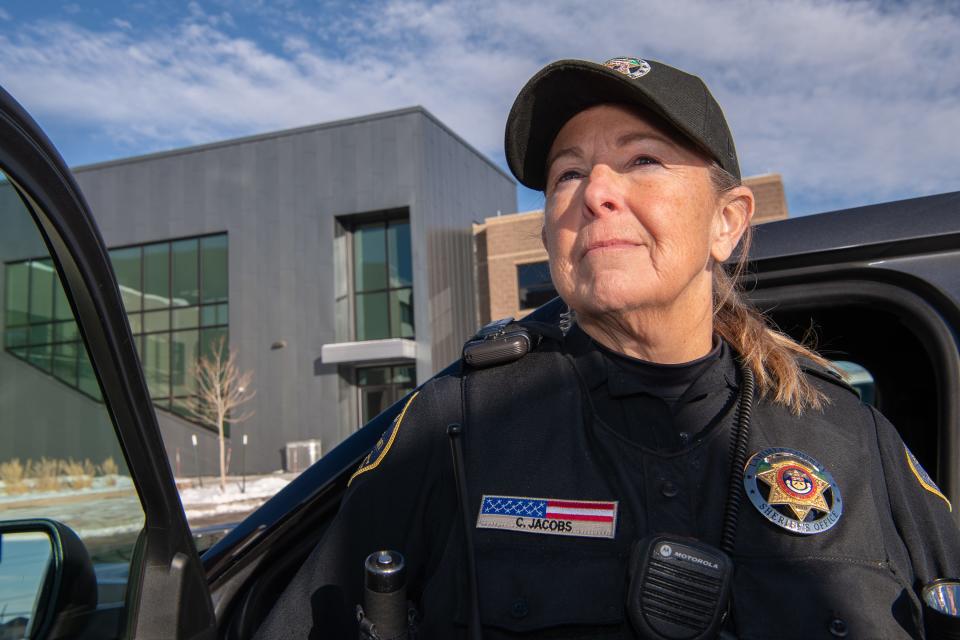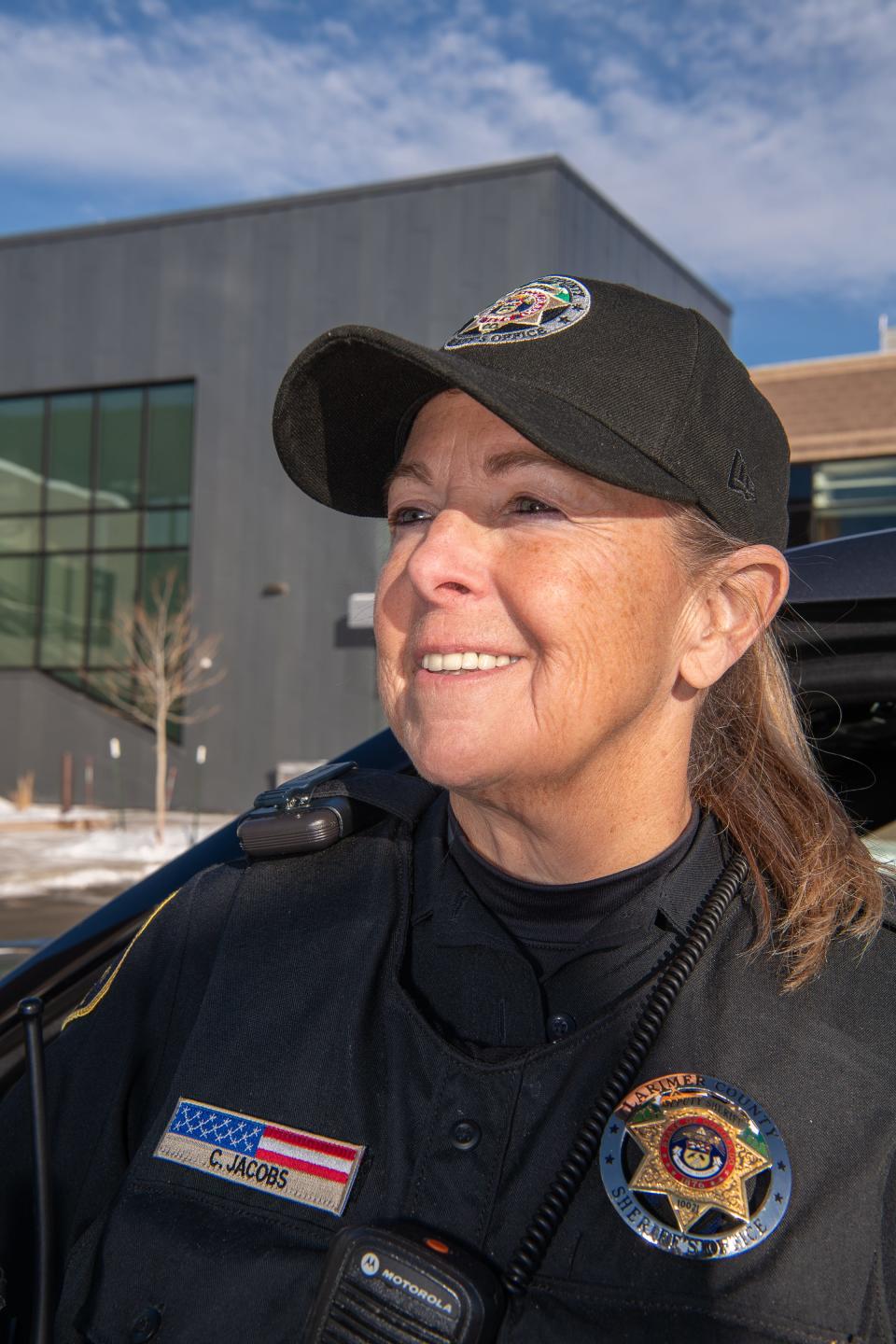Meet the Larimer County deputy who pushed for change to help with mental health crises
Before Larimer County Sheriff's Office deputy Cheryl Jacobs helped develop that agency's mental health co-responder program, a 911 call to report a person behaving dangerously while experiencing a mental health crisis might have brought five vehicles with sirens and lights along with nine uniformed people to the scene.
But today when that happens, Jacobs and her mental health clinician partner show up in an unmarked vehicle because that makes things calmer. Sometimes backup might be parked down the street, just in case it's needed.
"Hey, I know them," one of them might be thinking as they take the call, Jacobs told the Coloradoan. "Let’s call his mom. Let’s see if he’s on his meds. Let's see if I can get him to walk outside with the clinician (who he knows)."

Sometimes the team can help resolve the situation and leave the person on scene. Other times, they can take them to the county's new Longview Behavioral Health facility if treatment is needed.
They can also get them connected to follow-up care, medication assistance and wraparound services.
Before the program existed, if the person didn't go to jail or to the hospital, they'd just go home, Jacobs said. And even if they went somewhere for help, they'd eventually get booted, and then the cycle would repeat.
It's been more than five years since Jacobs led the creation of the program, and last year, it made about 6,700 contacts either in person, by phone or by email.
What started as a trial program with one deputy and one clinician now has four deputy-clinician teams, along with the team leads and supervisors supporting them.
In the past year, it expanded to include a youth crisis response team in Loveland's Thompson School District.
Back in Indiana years ago, when Jacobs was a hostage negotiator, she started to notice how her own actions could affect behaviors and outcomes.
Whether it was talking a suspect into doing something and making them think it was their own idea or just seeing people on their worst day, those experiences stayed with her when she moved to Colorado and became a deputy with Larimer County Sheriff's Office in 2010.
Then she stepped up to take Crisis Intervention Team training with NAMI, the National Alliance on Mental Illness. After that, she started working with an interagency team — made up of local law enforcement agencies, fire departments, paramedics, nonprofits, housing organizations and homelessness services groups — to identify and serve the people who were most frequently in need of their services.
For years, she had been telling her superiors at the sheriff's office that there was a gap in the department's services and they should be partnering with clinicians or therapists on certain calls.

Using the "Memphis Model" for crisis intervention teams, there was no need to re-create the wheel. But after Jacobs wrote a plan for their program, served on the board to create it and received grant funding, she and one clinician with SummitStone Health Partners got started "building the boat as we were sailing."
Former Undersheriff John Manago put his confidence in Jacobs and began a trial period, saying, "I'm trusting you on this," Jacobs said.
It didn't take long. Soon the department decided to add a second deputy-clinician team and was taking more calls than anybody else in the sheriff's office, Jacobs said.
In her time as a sheriff's deputy, Jacobs also helped to get the county's Wellness Court off the ground. That program is an alternative sentencing option for people in the criminal justice system who need mental health care.
She is a member of NAMI of Larimer County's Board of Directors, serves on an Interagency Treatment Group and has volunteered in adult protective services.
That interagency team determined that one of the people they frequently encountered was racking up $4 million to $5 million in costs simply for transport, ambulances, detox and and emergency room care, "and no success, just a cycle," Jacobs said.
Along the way, Jacobs' work has earned her the trust of many.
The director of the homelessness services provider Murphy Center for Hope knows that Jacobs isn't there to make arrests or serve warrants, so they can work together to get help to those who need it.
In fact, Jacobs said she's made only a few arrests in recent years, and just two last year.
"One of those guys still flags me down and talks to me," she said. "You (might) think of these people and think, 'This is a choice,' but then I start learning some backstories."
One man would run out of a house carrying a sledgehammer and a knife, scaring neighbors.
He had once been a doctoral candidate. But "if that’s what the voices in your head tell you to do, that’s what you do," Jacobs said.
Once her team was able to get him help through medication and hospitalization, Jacobs said she could see that he was an intelligent, articulate and kind-hearted person.
USA TODAY’s 2024 Women of the Year: See the full list of the 60 honorees from across the country
Funding for the program comes through state grants and the county budget. Jacobs said Larimer County commissioners believed in the program so much that they keep increasing funding even as budgets gets tighter every year.
"This year alone, (Jacobs) has prevented hundreds of criminal charges by choosing to listen and connect her community with the right resources," Maryann Ramos Flynn, who worked with Jacobs as a clinician, said while nominating Jacobs for the honor. "Cheryl has continued to push through barriers, stereotypes and naysayers about the power of a law enforcement officer being present during mental health calls. As someone who sat with her in that patrol car with her for eight to 10 hours daily for years ... she is a woman of integrity in a profession that can use more of that."
This conversation with Cheryl Jacobs has been edited for length and clarity.
Who are the women who paved the way for you?
There were few women (in my previous police department), so I decided what kind of officer I wanted to be. I came from a department that wasn’t as professional as this one, so I set my own moral compass there that was different. I hope that I have led a path for other people to follow to be a good deputy, a great mom and a good community member. I always take a chance to get with any brand new female (in the sheriff's office) to give advice on how to have a good career.
What is your proudest moment?
When former Undersheriff John Manago let me get this program off the ground and seeing it succeeding.
What was your lowest moment?
I almost got out of law enforcement during the Minneapolis Police Department things. I got into this knowing and very willing to give my life, but to be hated was something I had a hard time dealing with. I started remembering why I loved what I was doing. I can lay my head down at night, asking myself: Did I keep someone out of prison? Our wins are a little different.
What is your definition of courage?
Doing the right thing and running towards that crisis to help that person when they call 911, even though there’s fear. And with that (courage) comes not luck: I’m at the gym, studying, learning the trade and being a master of my craft.
Is there a guiding principle or mantra you tell yourself?
On the back of our high school T-shirts, it said: No one can make me feel inferior without my consent.
Who do you look up to?
Nobody in particular, but anybody that has the moral compass to do the right thing when nobody's watching and deal with people with dignity and respect. It doesn’t take rank for me to give respect.
How do you overcome adversity?
As passionate as I am about this job, I’m much more passionate about being a mom and grandmother. And keeping a work-life balance is hugely important to me. I don’t keep all of my friends at work. My closest friends are away from work.
(She said she also spends time praying, reading and making watercolor art.)
What advice would you give your younger self?
Your biggest talent is that you’re not talented at anything. Your best asset is your work ethic. There are some things I'm not going to be good at, but if there's something I'm interested in, work hard at it.
(Back in Indiana, she used to box, and she learned she could wear down her competitors by never backing down. "I’m not that great at this, but I do work hard at it.")
Keep working hard at everything you do and you're going to be happy with the outcome.
This article originally appeared on Fort Collins Coloradoan: Larimer County deputy Cheryl Jacobs at heart of crisis response
